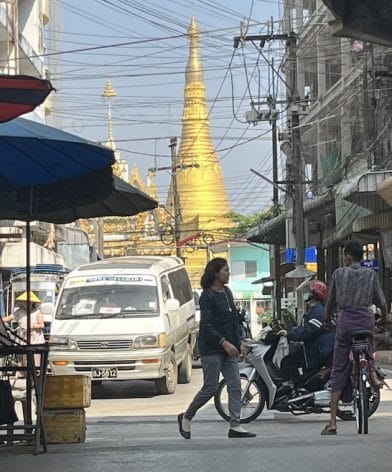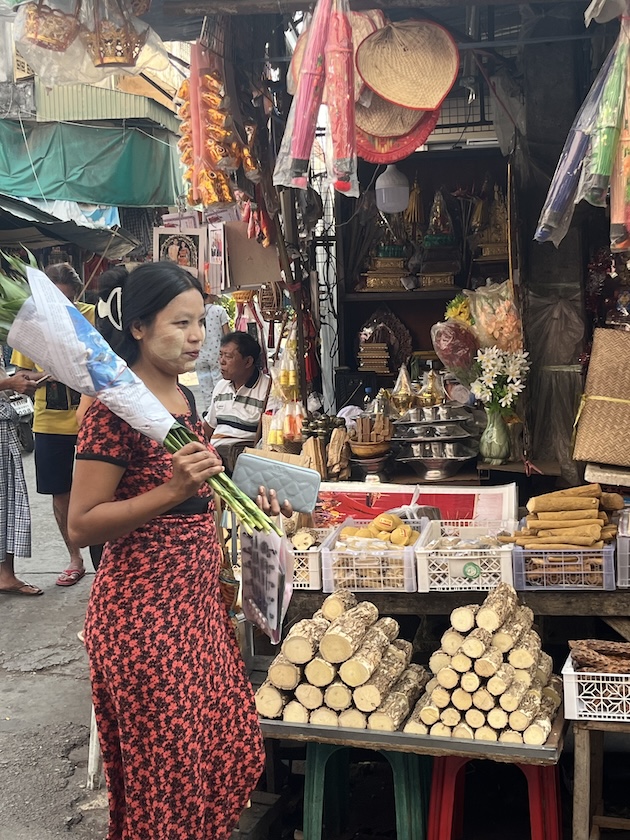Armed Conflicts, Asia-Pacific, Civil Society, Editors’ Choice, Featured, Headlines, Human Rights, Humanitarian Emergencies, Migration & Refugees, TerraViva United Nations

A Buddhist pagoda towers above a teeming thoroughfare in Mae Sot, a Thai town dense with tens of thousands of people fleeing conflict in nearby Myanmar. Credit: William Webb/IPS
– The news travelled like wildfire. In the teashops, bars, and market stalls that make Thailand’s border town of Mae Sot feel far more Burmese than Thai, the feared rumours circulating at the weekend were suddenly confirmed.
Military conscription would be imposed on young men and women for two to five years, regime-controlled broadcasters in Myanmar announced on the Saturday night airwaves. Details were sparse.
Panic scrolling through social media suddenly replaced conversation in one popular Mae Sot hangout run by a Burmese activist-entrepreneur for his clientele of exiles, fugitives, and migrants. Pool players stopped mid-break. “What the ***!” exclaimed the member of a rock band.
Myanmar’s junta has been at war with much of the country since staging a coup three years ago, but still, it has come as a serious shock that for the first time in modern history, the military will impose on young people the choice of two uniforms—army or prison.
Analysts—Burmese and foreign—interpreted the developments in various ways. For some, it was a clear sign that the military was losing this patchwork civil war and could not sustain itself. For decades, it had thrived on recruiting youngsters from poor areas of the Bamar-majority heartlands of Sagaing and Magwe. But now those same arid regions are hotbeds of resistance against the regime, its forces stretched across the length and breadth of almost the entire country, depending mostly on air power to bomb civilian areas into submission.

A Burmese woman wearing thanaka to protect her face from the sun walks through a market in the Thai border town of Mae Sot. The stall is selling the wood bark that is ground into the cosmetic paste so popular in Myanmar. Credit: William Webb/IPS
“An act of desperation,” Igor Blazevic said of the junta’s move, which follows sizeable territorial losses and a meltdown of its forces in northern Shan State late last year. Blazevic, a Myanmar expert at the Prague Civil Society Centre, predicted on Facebook that the measure would backfire because the regime was too “weakened and broken” to be able to administer recruitment on a large scale.
But on Monday night, more news was breaking that indicated the junta had got its ducks in a row—airports were suddenly requiring military authorisation stamped on tickets for even internal domestic flights. According to unconfirmed reports, some junta-controlled border posts were closing or imposing similar restrictions, and young men had been picked up on the streets of the commercial capital Yangon.
“It’s another way of terrorising the population,” was the view of one young Burmese who did not want to be named for obvious reasons.
In the Myanmar capital, Nay Pyi Taw, junta spokesperson Zaw Min Tun simply said conscription was essential because of the “situation”.
“The duty to safeguard and defend the nation extends beyond just the soldiers but to all citizens. So I want to tell everyone to proudly follow this people’s military service law,” he intoned.
No way, retorted May, a young refugee whose dream of becoming a doctor was shattered by the 2021 coup and the arrest of her father.
She said compulsory military service would simply drive more young people to join the People’s Defence Forces of the resistance— despite the heavy losses they are incurring and the military’s barbaric treatment of prisoners subjected to torture, summary executions, and, most recently, strung up and torched.
May slipped across the nearby border into Mae Sot with her family after spending two years as a refugee in a camp run by a section of the Karen National Liberation Army fighting what is known as the world’s longest-running civil war dating back to 1949.
“I cannot go back to Myanmar,” she said. At 19 years old, she fits the age range of 18 to 27 for single women to be conscripted. For men, it is 18 to 35 years, rising to 45 for specialists like doctors and IT workers who quit their state sector posts in droves after the coup, joining the Civil Disobedience Movement (CDM) of non-violent resistance.
On Sunday night in Mae Sot, large crowds of this latest wave of the Myanmar diaspora gathered for an outdoor CDM fund-raising concert, featuring dancing and music performed by several of the country’s ethnic minorities, including Karen and Chin. The concert was sponsored by an online bank set up by the resistance. Stalls sold knick-knacks and garments, and beer and hot food were swiftly ferried about by teams of neatly dressed waiters.
May and her entrepreneurial family had their properties and businesses seized and sealed by the military near Mandalay and are now rebuilding their lives, running a small restaurant among the estimated 100,000 to 200,000 Burmese living in and around Mae Sot, setting up businesses, social services, and accommodation safe from predatory Thai officials and regime spies.
May remains determined to study medicine somewhere somehow, representative of a young, capable, and innovative generation of Burmese plugged into a digital world while moving in and out of the shadows of war.
Bo Kyi, a veteran activist and former prisoner who co-founded the Assistance Association of Political Prisoners in Mae Sot 24 years ago, saw the military’s conscription order as a “huge challenge” for young people, especially those who had tried to keep out of politics and war. It would become very hard to leave the country legally now, he said.
“Millions will suffer and Burma will lose its human resources,” he said.
[embedded content]
William Webb is a travel writer who started out in Asia nearly 50 years ago
IPS UN Bureau Report
